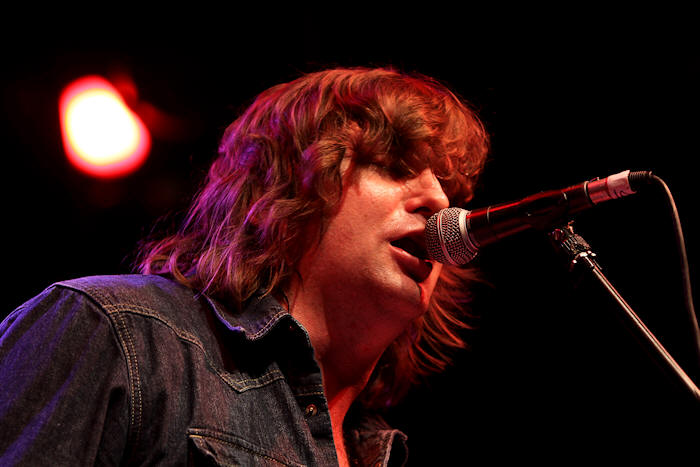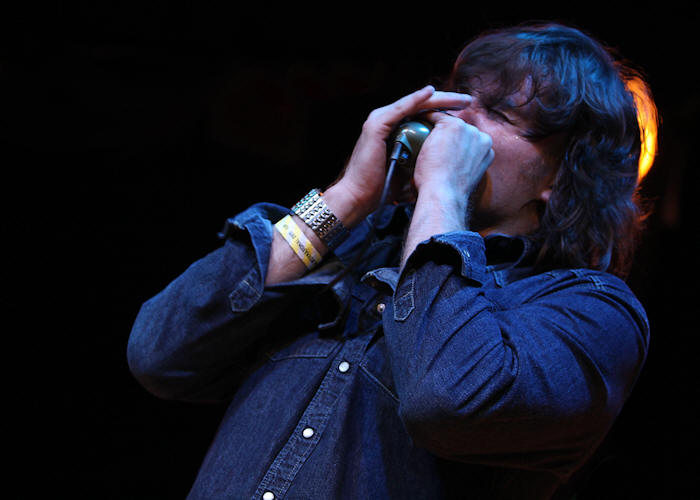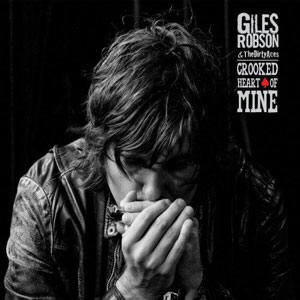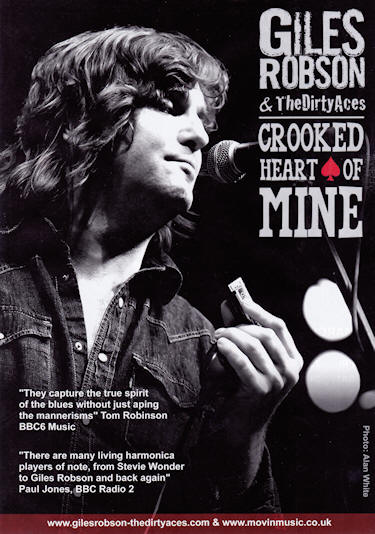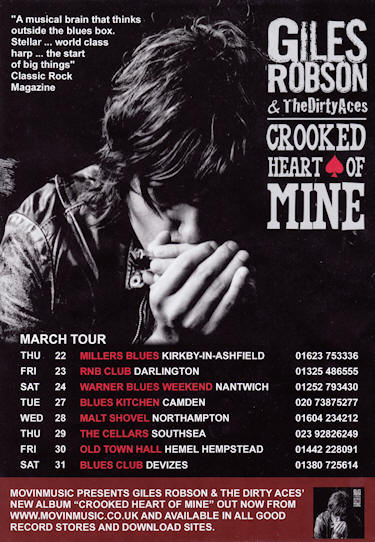
Painting © 2004 Loz
Arkle
Website
© Copyright 2000-2011 Alan White - All
Rights Reserved
Site optimised for Microsoft Internet Explorer
Early Blues Interview
|
|
'When harmonica players Sugar Blue and Paul
Jones describe Giles Robson as one of the great living blues harmonica
players you know he's bound to be a bit special. This is the real deal' 'Giles is no mere imitator, this guy is an
original with classy influences. He blazes a trail on harmonica: tons of
Chicago wizardry and blow bends the equal of top end maestro Sugar Blue' 'Giles Robson's blues harp can only be
described as exquisite. This man could well be the best harmonica player
on the blues scene today' Alan: Giles, I realise you live in Jersey now, are you originally from Jersey? Giles: Yes, I was born here. Alan: What were your first musical memories there? Giles: I used to play violin and I played alto saxophone but I started hearing harmonica on TV so I bought a harmonica on an art trip to Toledo in Spain when I was 14 years old. When I got back there was a local guy called Bob Pilling who used to write for Blues in Britain, Blues & Rhythm and a couple of other magazines and he brought a lot of artists over to Jersey. Literally the weekend I got back from the art trip to Spain, there was Cephas and Wiggins playing at the local arts centre so it was the most amazing introduction to the Blues Harmonica. Alan: Do you come from a musical family? Giles: My parents werenít musical but my great-grandfather used to sing opera but that was way back and it was a bit of a shock to my parents when I took up music so seriously. Alan: Did you always want to become a musician? Giles: No! I was always pretty aware of how hard a life it is and I started out being an illustrator, and drawing was my first love, but I loved the blues too and it took over really. Alan: So how did you get started in music in the first place? Giles: I got this harmonica in Toledo and I got into blues music, and then at a music competition at school I played Hoochie Coochie Man and won, just two years after I got the harmonica. Then I was playing in pubs from the age of 16 onwards. My big hero when I first started was Muddy Waters because he had the best vocals and he the great harmonica players behind him - Little Walter and James Cotton. When I was starting out they had all those Charley Blues Master works, you know with the black covers, and the one I had was Muddy Watersí Rock Me Baby, and it had all the old takes with Little Walter and James Cotton and I just played along to those endlessly. I really fell in love with the power of the harmonica, thereís so much in the tone, its incredible.
Alan: So what first attracted you to the blues and what does it mean to you? Giles: Well, I always thought it was the harmonica but also the vocals. I can remember being 16 and doing my GCSE art homework and listening to Muddy Waters. My Dad would say, ďWhy are you listening to that depressing music?Ē and I tried to explain that there was something in the blues vocals that I absolutely loved. I hear it in Charley Musselwhite, in Muddy Waters, in Sonny Boy Williamson. Itís a different way of singing than the modern pop singing, more of a spoken way of singing which I think comes from the preacher tradition. Like Johnny Cash or Jimi Hendrix when you are speaking the words rather than singing a melody. Thatís whatís always attracted me to blues music and given me a thrill. When I first heard Jimi Hendrix or Bob Dylanís Lazy Day Women, that was the sort of thing that really turned me onto the music. Alan: So who would you say has influenced you the most in your playing? Giles: To begin with it was definitely Little Walter and James Cotton. I used to listen to the 'Hard Again' Muddy Waters album religiously, just for James Cottonís harmonica playing. But as Iíve got older Sonny Boy Williamson II is the one I listen to the most now because I think on his records heís got everything going on for him. By the force of his personality he managed to get the best performances out of the band [harp] he was using. Heís got that raw sound, the spontaneity, thereís always something interesting going on, probably because he approached songs differently each time. He was an amazing musician. At Ronny Scott's club I spoke to Elvin Jones, John Coltrane's drummer, about harmonica players and Sonny Boy was the name that came up as well as Little Walter. I think he's really appreciated by a lot of jazz fraternity and by musicians across the board, he's the one that people tend to go for.
Alan: Looking back at your career so far, what are your fondest memories? Giles: I think working with Mud Morganfield was a great thrill, and playing some of those old Muddy Waters tracks. And also we got the Dirty Aces out on the road and Colne was a really great experience for us. Mud Morganfield is always a sure fire hit because itís the traditional blues sung by Muddy Waters's son and you know the audience is always going to like it. But when we took the Dirty Aces out on the road we had just a whole set of original material and we didnít know how it was going to go. I think my fondest memories have been those gigs where the songs have gone down a storm as they are completely original. Alan: It certainly was a wonderful set at Colne. Giles: Yes, we recorded it so we can listen back to it and hear that audience reaction. But I was a bit nervous beforehand and it was just great to get that reaction from the crowd. Alan: They are a great crowd at Colne - they really appreciate their music. Giles: Yeh, it's fantastic and a great venue as well. Another great memory was when I brought over the Animals with Steve Cropper to Jersey and I got to chill out with Steve Cropper. Alan: How did that come about? Giles: Peter Barton was telling him about my harmonica playing and he said, Oh, youíve got to come up and we just musically hit it off straight away. Afterwards he said to me it was a pleasure sharing the stage with you. We were in the hotel bar afterwards talking about all the old Albert King records and it was really interesting to get his perspective on my favourite blues artists, from a businessman's perspective. He managed to make Albert King into a very commercial property.
Giles: They all do to a certain extent. When Iím writing itís usually from personal memory and I try to do stuff thatís not to clichťd. I try to get a feeling of the past without being too beholden to the past. As a harmonica player it drives me nuts to look on You Tube and see all the contemporary harmonica players stuck in the Little Walter 12 bar shuffle mode and thereís a lot more to the instrument, it has a lot more melodic possibilities. I think the harmonica will have a revival, partly because I think people havenít really known how to play it but thereís a lot more instruction now on the web and in music shops. Alan: Tell me about The Dirty Aces. How did you all come together? Giles: The band was originally formed with guitarist Filip Kozlowski in 2007. We did a live album with the Jersey Rhythm Section but some of the members had good jobs and families in Jersey so couldnít commit to the touring so Mike Hellier stepped in on drums and he sourced Ian Jennings on bass, so we had musicians that could commit to touring. We did the two Mud Morganfield tours. Itís worked out really nicely with a good working relationship. Alan: How did you first meet Mud Morganfield? Giles: I booked him! I work as a promoter in Jersey as well and I was trying to promote the band and also to make a little bit of money. I spotted Mud on-line and this was before he became more popular so I invited him over to Jersey to do some shows and thatís where I met him. We were really happy to do the two tours but we didnít want to get typecast in that traditional Chicago mould so we thought we should try to move on and go out there ourselves with our own material. Alan: I believe Mud is coming over again next year. Will you be touring with him again? Giles: No, we really want to concentrate on our stuff now. Weíd have had a tremendous amount of profile boosting like being played by Chris Evans on Radio 2 and Tom Robinson on Radio 6. Weíve being mentored by a rock band management at the moment so we are really looking to get our own stuff out there. Itís hard because we are not a household name but itís very fulfilling to get the music out there. Alan: Tell me about the making of your new album, Crooked Heart of Mine; where was it recorded and how did you get it all together? Giles: Filip Kozlowski who I co-write the majority of the material with, has an engineer friend with an amazing studio in Poland, We had two amazing gigs with Mud in Poland at the end of the UK tour and after the tour went straight into the studio and cut 10 of the 13 tracks. Then we went back the following March to finish it off. Itís going well, the CD has had an amazing response and itís got good cross-over potential. It is rocky, but itís not going down the classic rock route of say Joe Bonamassa or Oli Brown or those guys with their polished guitar work. Itís more grimy and Tom Waitesy with a raw vocal. My vocal has been compared to Charlie Musselwhite and those people and Iím trying to get a really raw blues vocal.
Alan: You mentioned earlier that you do promotion work in Jersey. Tell me a little about the music scene in Jersey. Giles: Itís very small but it has peaks and troughs. Itís main problem is that itís an island, and a very expensive stretch of water because of Jersey's blossoming finance industry. Itís a good scene but itís hard to get acts over because of the transport costs. We try and work our way round that with sponsorship and so on, but it is hard. But it is a very appreciative audience when we manage to get people across. One of the great things about promoting is that Iíve promoted Paul Jones, Dave Kelly, Georgie Fame, Albert Lee, Chris Farlowe, I've put on shows for all these people and they just get better with age. When you are playing music like the blues it just keeps getting better and doesnít have a shelf life. Alan: So how do you see the future of blues music? Giles: I think itís got to keep evolving and not be too nostalgic. It can still sound like blues and still keep the atmosphere of blues but itís got to keep being original for people to listen to. Thereís only a limited amount of people that will listen to retro 50ís blues and understand it. Youíve got to take the best elements out of that and put it in a more contemporary framework. It neednít be gimmicky but it just means playing around with structures and rhythms to make it sound a bit more 21st century. With people like Joe Bonamassa selling out the Albert Hall and Hammersmith Apollo, thereís a lots of good young players coming through and itís looking really healthy indeed. I also think the internet is going to be the biggest help to the fertility of music because people arenít seeing things chronologically any more and you get young people looking at stuff from the 50s. As opposed to 10 years ago you can go on YouTube and see footage of early blues players such as Eddie Taylor, Little Walter or Jimmy Reed. Alan: I believe youíve got a little mini-tour coming up with six dates. Are you looking forward to it? Giles: Absolutely! We really love being out on the road and we are really wanting to push it to get more work in for 2012. Being out on road always opens up more doors. Alan: Thank you very much Giles for your time and good luck with the tour.
_________________________________________________________________________
Album available from: or Movinmusic Agency: www.movinmusic.co.uk/gilesrobson Check out photos of Giles Robson & The Dirty Aces at the Colne R&B Festival Check out photos of Giles Robson & The Dirty Aces at Skegness Rock & Blues Festival
_________________________________________________________________________
Return to
Blues Interviews List |








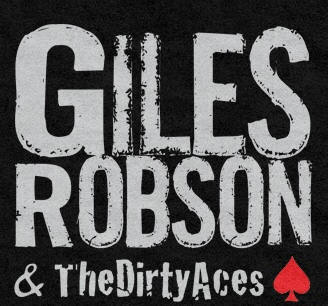
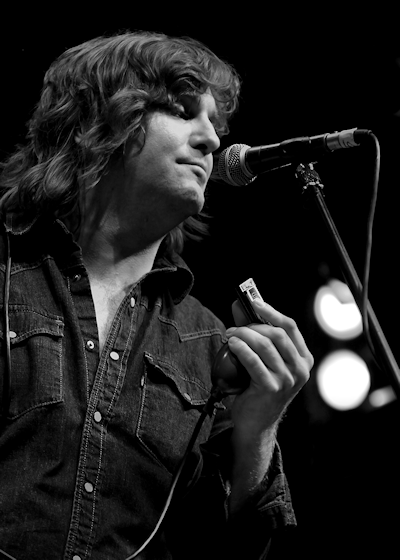
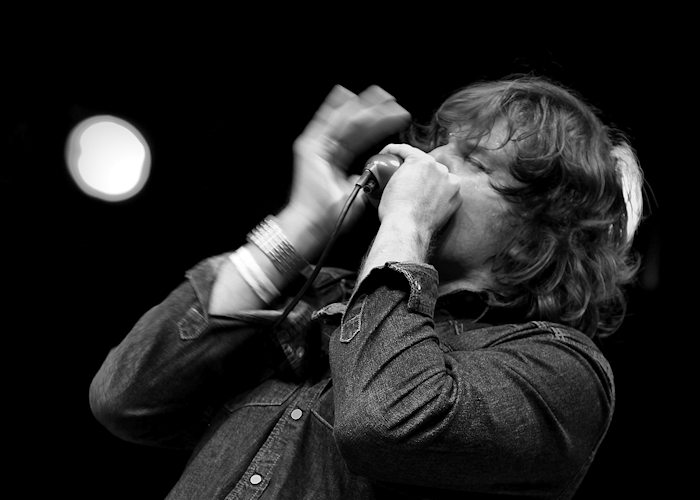
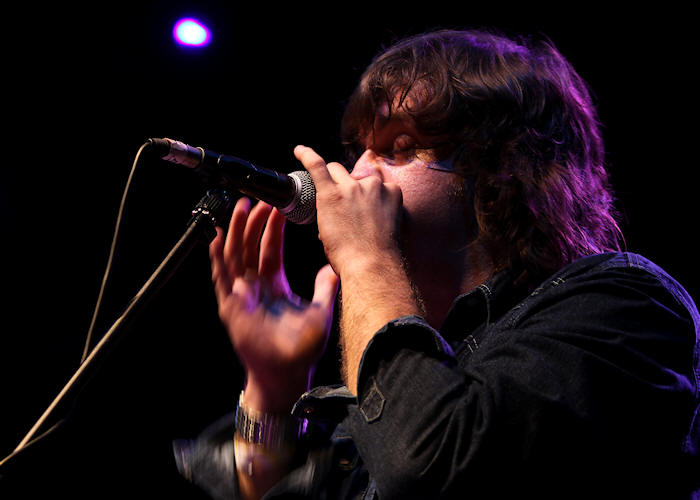
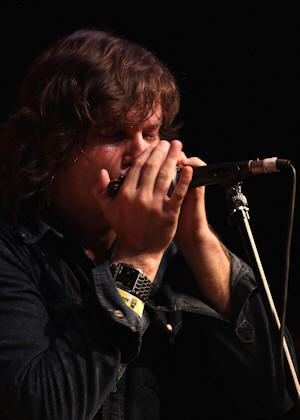 Alan:
Are there any particular songs you play that have special meaning to
you?
Alan:
Are there any particular songs you play that have special meaning to
you?